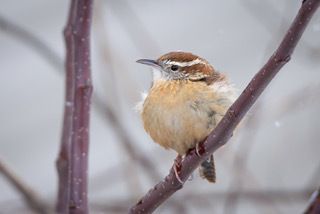Published January 5, 2021
Brrrr…Birding in Winter!
Audubon Offers Virtual and Outdoor Winter Birding Programs
Some birds look much plumper in winter, but it isn’t from weight gain. They fluff up their feathers to trap the warm air from their bodies. It’s like putting on a warm, downy coat. At night, when the cold really sets in, some birds have learned to drop their body temperature and huddle together to conserve energy. Species like Black-capped Chickadees and Eastern Bluebirds will find cavities or nesting boxes where they can huddle together.
Birds also have a high body temperature (approximately 105 degrees Fahrenheit) and high metabolism, so they need to be constantly feeding. Chickadees, Tufted Titmice, and Kinglets often create a mixed flock of birds that actually help each other. They comb the area for berries and seeds. If they notice their neighbor has found food, they all head in that direction. When a bird feeder first goes up in winter, many people notice that a flock of birds quickly appear all at once. That’s because certain species actually communicate where food can be found. It is a great adaptation to have when resources are scarce.
Interested in learning more about local birds? Audubon is offering online winter birding workshops with several sessions and convenient times. Learn from the experts safely at home, head outside to practice your birding skills, and then reconnect again with Audubon to have your questions answered. Take your birding skills to the next level! New birding walks are also available to compliment these workshops, all following COVID-19 safety guidelines.
Virtual Workshops:
In-Person Programming:
Explore our Nature Program events calendar at asri.org/calendar!
New! Sunday Morning Bird Walks with Audubon
Audubon Nature Center and Aquarium, Bristol, RI; 8:30 – 9:30 a.m.
Sunday Mornings Beginning February 7, 2021 and continuing through the spring. Register through the events calendar.


















